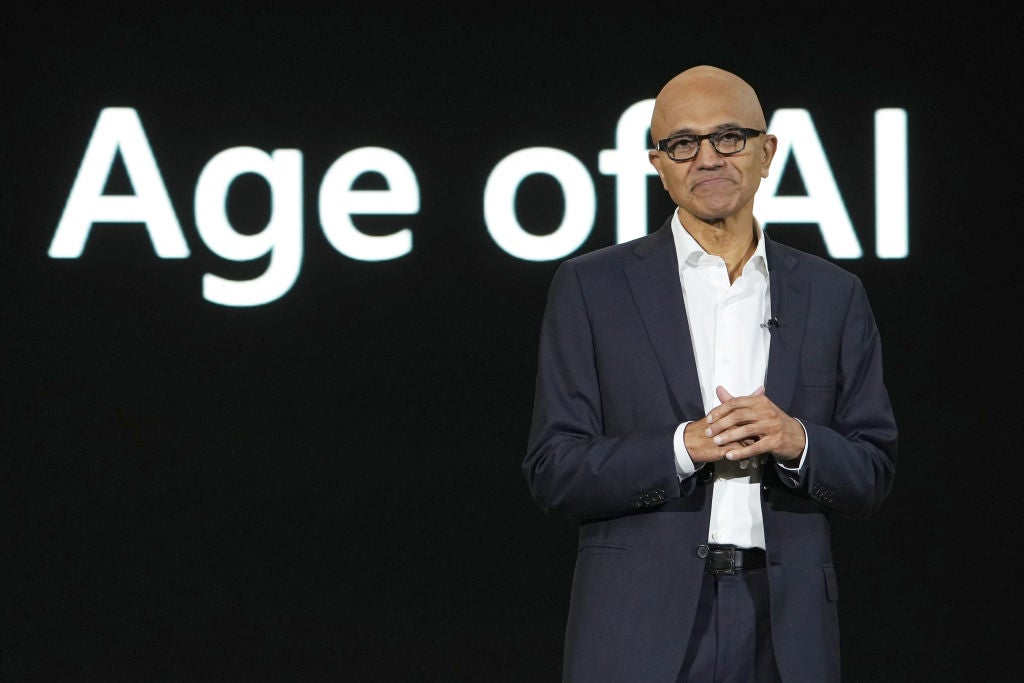
“I don’t see a world where AI replaces writers,” Jon Steinberg, CEO of international media group Future plc, told an audience at the Press Gazette’s Future of Media Technology Event on Wednesday (6 September).
The launch of OpenAI’s ChatGPT in November 2022 began a generative AI transformation which Steinberg says has been an “unbelievably disruptive” force on search engines. “I’m not sure of the purpose of generative AI right now,” adds Steinberg as he and the rest of the media world experiment with use cases to identify the technology’s underlying utility.
According to research analyst GlobalData, integrating generative AI into any core business is one of the primary themes keeping business leaders up at night in 2023. Accompanying the hype is a clear business opportunity. The global AI market is set to reach $909bn by 2030, growing at a compound annual growth rate (CAGR) of 35.2% between 2022 and 2030, according to GlobalData’s 2023 TMT Predictions.
Generative AI replacing human jobs is a concern across all sectors, including within the creative industries. A call to action against the use of AI by the Hollywood writers and actors unions over the summer (2023) demonstrated just how serious these concerns are – whether valid or not.
Will AI replace human creative industries?
Chris Duncan, Bauer Media Publishing UK CEO, says AI will not render journalists obsolete but rather it will be used instead as a tool. A chorus of agreement within the media industry that AI is unlikely to replace the journalist population lies in direct opposition to many technologists working in the trenches of AI development.
Markus Karlsson, CEO of AI business platform provider Affino says AI driven transformation within the publishing industry cannot be understated. Karlsson believes that within a decade, the majority of publishing content will be AI generated. AI represents the biggest sea change within the industry for the last 15 years – since the advent of the cloud, says Karlsson.
How well do you really know your competitors?
Access the most comprehensive Company Profiles on the market, powered by GlobalData. Save hours of research. Gain competitive edge.

Thank you!
Your download email will arrive shortly
Not ready to buy yet? Download a free sample
We are confident about the unique quality of our Company Profiles. However, we want you to make the most beneficial decision for your business, so we offer a free sample that you can download by submitting the below form
By GlobalDataHowever, on the question of whether publishers should still invest in humans over AI, even Karlsson is sanguine. “Of course, the answer is both,” he says.
Generative AI for media
Generative AI business use cases broadly fall into two camps. On the one hand chatbots are searching and summarising content in regurgitated forms which can be rife with error and ‘hallucinations’ (the mimicking of fact-based text which appears plausible despite being incorrect). And while Steinberg says gen AI chatbots are improving the way they take existing content and summarise it, “that’s not where I see the opportunity.”
In the second camp lies product enhancement which is really the underlying value proposition for businesses investing in generative AI, adds Steinberg.
Matt Monahan, chief technology officer, at Arc XP, digital publishing platform and subsidiary of Jeff Bezos-owned The Washington Post, which hosts over 2000 sites globally is positive about the kind of product enhancement AI can bring publishers while reiterating the increasing importance of original content.
Large Language Models (LLMs) can be used as predictive models for creating language – the technology behind chatbots such at OpenAI’s ChatGPT work in this way. LLMs do a “decent” job at writing stories, says Monahan. But the best way for publishers to use generative AI is as an enhancement for original content not a replacement, in addition to automating mundane tasks.
Monahan says copywriting is an area in which generative AI can add much value. Suggesting and testing multiple headlines, for example. Another, is the mass translation of content to explore new markets without the prohibitive costs of traditional market research. Formulaic articles such as product reviews or product comparisons continue to be a very resilient publishing segment. AI can provide significant enhancements in this area, says Monahan.
A publisher’s practical use of generative AI
Until further quality developments in generative AI, publishing companies can use the technology to enhance human workflows and close the gap between high and low performers, says Marija Gavrilov, CEO of Exponential View, a publisher uniquely focused on the transformational changes brought about by technology. Gavrilov suggests that publishers approach AI in three ways: for research support as a kind of proxy librarian; a thought partner acting as a “brainbooster for creative thinking”; and as “a really clever intern” to share drafts with for feedback and suggestions.
Gavrilov’s trifecta for AI success hardly demonstrates sweeping changes but are the stepping stones for publishers entering the testing stages of AI enhancement.
In the longer term, publishers will need to navigate massive step changes in the way content is produced, packaged and distributed. Digital avatars indistinguishable from humans delivering personalised news; AI generated copy; headlines and news curation are just a few examples of AI disruption. Meanwhile, primary source content will become increasingly valuable as the industry sees exponential change over the coming decade.
And with this change questions arise around copyright, the legitimacy of public LLMs like ChatGPT scraping original content for machine learning, antitrust concerns around Big Tech platforms’ dominance exacerbated through AI, as well as concerns about the spread of misinformation through AI generated content.
Although AI throws up a raft of intellection property (IP) related issues for media companies, it can also be used to help combat them, according to GlobalData’s Thematic Intelligence Artificial Intelligence in Media published in July 2023. Applications detecting fake and inaccurate information are in development and can help media companies protect their IP – a plausible alternative to the unsustainable and painstaking manual method of processing ever increasing data volumes.
These are all issues that publishers must address now, as well as a real need for the industry, according to Gavrilov, to “unpack its value chain.” As the question of AI vs human becomes ever more pressing.







